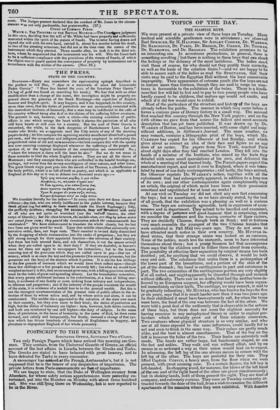STATE OF THE COUNTRY.
THE PRESS.
STANDARD—Every one remembers the equivocating epitaph described in the preface to Gil Blas, " Aqui es a encerrada el alma del Licenciado Pedro Garcia." " Here lies buried the sotn. of the licentiate Peter Garcia." (A bag of gold was found on searching his tooth.) We fear that with no other modification than a change of the name, this inscription might be properly en- graved above the gateway of the Stock Exchange—the sspulchre of English honour and English spirit. It may happen, and it has happened, in this country, more than once, that the duties of patriotism are not necessarily connected with thn immediate instincts of humanity, that a man may he indifferent to the calls of his country without being also dui' to the claims of his suffering fellow creatures. The present is nut, however, such a crisis—the existing condition of public affairs is one which wrings the heart while it alarms the patriotism of all who still have hearts or still care for a country. But the soul of Peter Garcia is entombed, the while, in the dark dungeons of Bartholomew Lane. Let the reader who thinks we exaggerate read the City article of any of the morning papers to-day ; let him compare the agonising anxiety manifested about half a pound per cent., and the scrupulous and indignant jealousy employed in estimating the proportional value of old and new annuities—let him compare this with the apathy and ever sneering contempt displayed whenever the sufferings of the people are spoken of, or the highest interests of the constitution are concerned. No ; "where the treasure is there will the heart be also." But we do not mean in these remarks to libel the whole English nation. They are not all the slaves of Mammon ; and they amongst them who are enthralled in the hateful bondage are, . perhaps, not worse than the money-worshippers of other nations, and other times. The great Greek tragic poet puts into the mouth of his Theseus, a classification of the body politic, which is as full of truth as poetry, and which is as applicable to England at this day as it was to Athens two thousand years ago :— Teti; yete WOXITWF ?MOSS, tT4 (ZIP OX13/011 AY8100.14, Tt, a•limpeor i=sezarl 011.1lX ipCOPM, dal 0,X.MY401Tle Awes rsporric TY filmy, gauss picot. Tenn Ss palm, lir !curio crs4t, groXsu, Rerun 9tasserser OPT'; ar Tait; vox's.
We translate literally for the ladies—" In every state there are three classes of citizens—the rich, who are wholly indifferent to the public interest, because they thinkofinotoieg but adding to their. .wealth (vide the Stock Exchange); 2tIly, the perfectly destitute ; struggling fot existeneb, they twellevtAffed -with envy. of all who are not quite so wretched (see the radical classes, the other corps of liberals); but the class between, the middle class, are they by whom states are saved from ruin; they guard the constitution which the commonwealth has established." We.have endeavoured to translate the whole closely, but the last two lines are given word for word. Upon that middle class,rthat universally con- servative order, then, our hope rests. Their number is irnieed daily diminished by the dropping of whole communities into the ranks of pauperism ; but they are still strong enough for their appointed function—the salvation of their country. Let them but look around them, and ask themselves, is not the season arrived when they are called upon to do their duty ? If they are doubtful, in heaven's name let them not apply to newspapers for instruction ; but to the honest, unerring test of the poor-rate which they are called upon to pay—that tax of misery, which is at once the test and the promoter (the necessary promoter, but the promoter not the less) of the distress which it proves. It is not the few shillings or the few pounds of increase which we would have them reflect upon—though these few shillings or a few pounds may be severely felt; but what we would have weighed seriously is this, that an increased poor-rate, with a falling provision market, must be the index of great and spreading misery. Let the householder remember, that every penny additional increase in his,contribution at a time of falling mar- kets, is evidence of one family or more sinking from industry and independence, to idleness and pauperism; and if the industry of the people constitute the wealth of the state, it is evidence of a tenfold loss to to the general wealth. But this is not the strongest recommendation of the present state of public affairs to the at- tention of those by whose active zeal, and by whose active zeal alone, it can he ameliorated. The middle class appointed to the salvation of the state owe much to their country, but they owe more to their kind ; the duties of patriotism are high, but the duties of humanity are higher: here, however, both duties coincide, and both are reinforced by one still higher—the duty of religion. In the name then, of patriotism, in the name of humanity, in the name of God, let them come forward, and calmly and temperately, but firmly, demand a change of that sys- tem which has driven hundreds of thousands of Englishmen to beggary, and threatens to depopulate England of her whole peasantry.


















 Previous page
Previous page